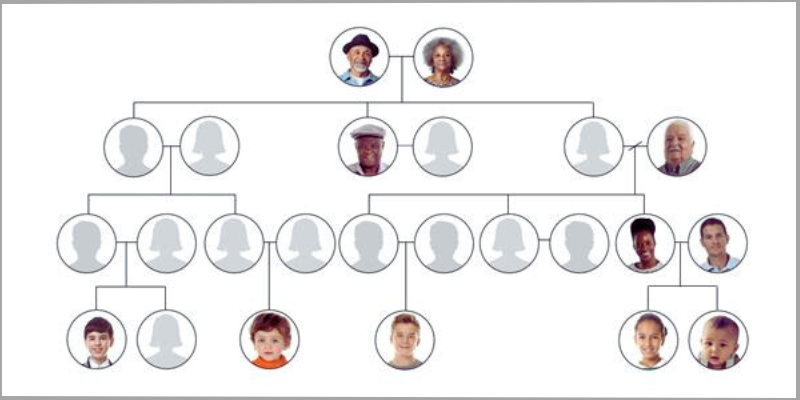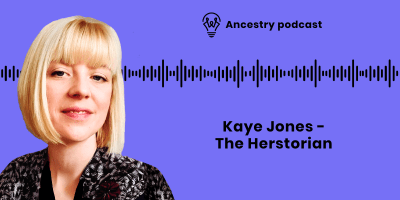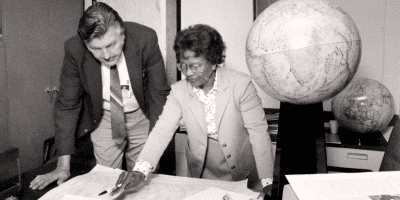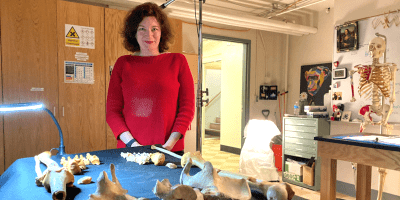Kate Phillips is child nursing lecturer and the Professional Lead for Nursing and Lisa Forbes-Grant is a lecturer of mental health nursing and the Programme Lead for Mental Health nursing at the University of Leeds, School of Healthcare. Kate and Lisa have worked together on an award-winning interactive digital learning resource, called the Baines Family Tree, which is used as a teaching resource within healthcare programmes in the School of Healthcare at the University of Leeds.
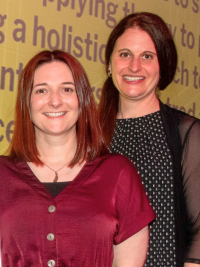
“The narrative approach used within the Baines Family Tree helps promote students’ consideration of the human element of care. They are encouraged to consider the social and environmental context of people’s lives and how this may be influencing health.”
Educational background and career to date
Kate Phillips: I’m a child nursing lecturer and the Professional Lead for Nursing at the University of Leeds, School of Healthcare. I hold professional NMC registration as a SCPHN (health visitor), children’s nurse and adult nurse. My nursing clinical background has primarily centred around practicing as a health visitor, working with families and communities, carrying out child health surveillance activities and promoting health and wellbeing.
My career moved into higher education in 2015 due to my passion for teaching and supporting the development of the future nursing workforce. My professional role is driven by my passion for developing innovative learning approaches that facilitate an effective and engaging learning environment for students, so they can apply evidence to practice in a meaningful and creative way.
It is so fulfilling when I watch students mature and grow over their three-year degrees and they are empowered to become proficient and compassionate healthcare professionals, privileged to be part of and influence their professional journey.
Lisa Forbes-Grant: I am a lecturer of mental health nursing and the Programme Lead for Mental Health nursing at the University of Leeds, School of Healthcare. I have a clinical background working with children, young people and families as a mental health nurse and health visitor. I have experience of leading practice innovation in the NHS and social care, with a focus on promoting relational and restorative practice.
I joined the University of Leeds in 2022, contributing to the development and delivery of the undergraduate nursing curriculum within the School of Healthcare. I love teaching nursing students and seeing not only their academic development but also their professional development over the nursing course. I’m keen to ensure that the importance of working with people and communities in a holistic and person-centred way is at the core of the nursing curriculum.
Engaging and interactive/supportive and safe
Our day-to-day work in the School of Healthcare and our roles and responsibilities vary so much that no two days are the same. The work primarily involves creating a supportive and safe environment for our students to learn, where they feel a sense of belonging and are empowered to reach optimum learning outcomes.
Through teaching, assessment, student supervision and pastoral support, we strive to develop an engaging and interactive environment which places our students at the centre of everything we do. We are always thinking about how things impact them and how we can adapt, develop and improve to ensure we are creating a contemporary and authentic environment. We aim to meet the student’s individual needs and prepare and effectively equip them to enter an ever-evolving healthcare environment.
Bridge the ‘practice-theory gap’ in nursing education
The Baines Family Tree is an interactive digital learning resource used as a teaching resource within healthcare programmes in the School of Healthcare at the University of Leeds. The resource presents an ancestry of forty individuals from a four-generation, multi-cultural family. It provides details of their personal, social, health, medical, and scenario-based information, which has been fictitiously created from our vast clinical experiences and that of our professional colleagues, as well as guidance from service users.
The family tree has three interlinking views, representing the three years of the curriculum of a healthcare degree, and the family members’ storylines develop and evolve to meet the curriculum learning outcomes set within these healthcare programmes.
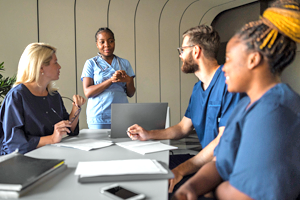
The Baines Family Tree addresses this issue and is used as a resource within the delivery of our curriculums, to support the creation and development of innovative teaching methods that enable students to apply theory to practice more easily. The Baines Family has widened this learning capacity at Leeds by enabling students to apply theory to practice in a more person-centred and meaningful way than using paper-based scenarios in previous years.
Harnessing digital technology to learn about the human element of care
The narrative approach within the Baines Family Tree helps to promote students’ consideration of the human element of care. Students are encouraged to consider the social and environmental context of people’s lives and how this may influence health. They can also consider holistic and systemic factors related to health, well-being, and family dynamics and how these may help or hinder health and well-being. This promotes enhanced critical thinking in care planning and supports ‘higher level thinking’ when understanding and applying key theoretical concepts.
The resource is used within module teaching, assessment and clinical simulation. Use in classroom-based learning and assessment has supported the introduction, conceptualisation, and application of fundamental health and social care practices and principles, whilst engagement with the interlocking soap-opera-like stories has fostered emotional connections between the students and the family members. These connections have been further supported by acted simulations, contributing overall to a highly authentic learning experience.
Combining clinical and digital expertise
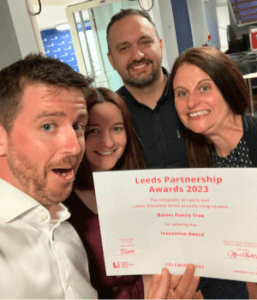
Working in partnership and bringing our clinical and digital expertise together was key to the innovative development and success of the resource, as well as passion for the project and our effective teamwork. The resource is hosted on the authoring software, Articulate. It is digitally sustainable, updatable, and adaptable to the needs of different programmes and modules.
Each family member can be selected, taking the user to a tab-based screen that contains their personal, social, health, medical, and scenario-based information. The resource is designed to allow students to freely explore the lives, relationships, and interactions of the different family members over the course of a three-year narrative. Students gain password-protected access to a new year for each year of their course, contributing to the impression of interacting with and getting to know the ancestry of an authentic virtual family in real-time.
Using an ancestry approach to learn to consider potential hereditary and genetic risk factors
The ancestry approach of the Baines Family Tree enables students to consider individuals from a more person-centred and systemic perspective. It introduces students to a wide range of ethnicities, health conditions, and social contexts, highlighting a diverse demographic.
This approach enables students to consider potential hereditary and genetic risk factors and how these important factors may have an influence on health outcomes, supporting the application and understanding of the concept of genomics. This supports students to think more preventatively and embed the importance of promotion and prevention within healthcare care planning, a key concept in contemporary healthcare legislation and policy.
The ancestry approach also supports and embeds an ethical-based approach to care planning as it encourages students to think about culture, family dynamics and relationships. It enables students to consider a more family-centred approach to care and how care and interventions need to be individualised to the family and their social and environmental context, with consideration of parenting capacity and available family support.
From small project to large-scale award recognition
We were over the moon to win a University of Leeds Teaching Award in 2023 as well a University of Leeds Partnership Award for Innovation. What started as a small project for our first-year students has grown and developed into an award-winning learning resource that has been used across the healthcare programmes and received excellent feedback.
It has been amazing working with such a creative and motivated team and we are passionate and excited about continuing to grow and develop the resource. It has demonstrated the value of working collaboratively to develop innovative, creative and authentic learning experiences for students.
Ultimately the hope is that such learning approaches will enable student nurses to provide an excellent standard of care in their future practice, with a positive impact on patient experience and outcomes and overall strengthening the future healthcare workforce. The recognition of the importance of ancestry, family stories and relationships within healthcare education, to complement consideration of theory and concepts, will hopefully motivate further innovation in this area of work.
Coming up next
The Baines Family tree is continuing to grow and develop and be used more widely in our school and in more and more innovative ways which is so exciting. We are looking at developing it further to add more visual and auditory content to enhance the authenticity and emotional connectivity for students when using the resource.
We also want to share our success more widely. We have already promoted the development of our resource at national conferences but also want to embed this further through publication. Please reach out to us if you’d be interested in learning more about our work. It has almost developed its own following and identify and as a resource is inspiring creativity within teaching and learning at our school and facilitating greater innovation in the development of interprofessional learning opportunities.

